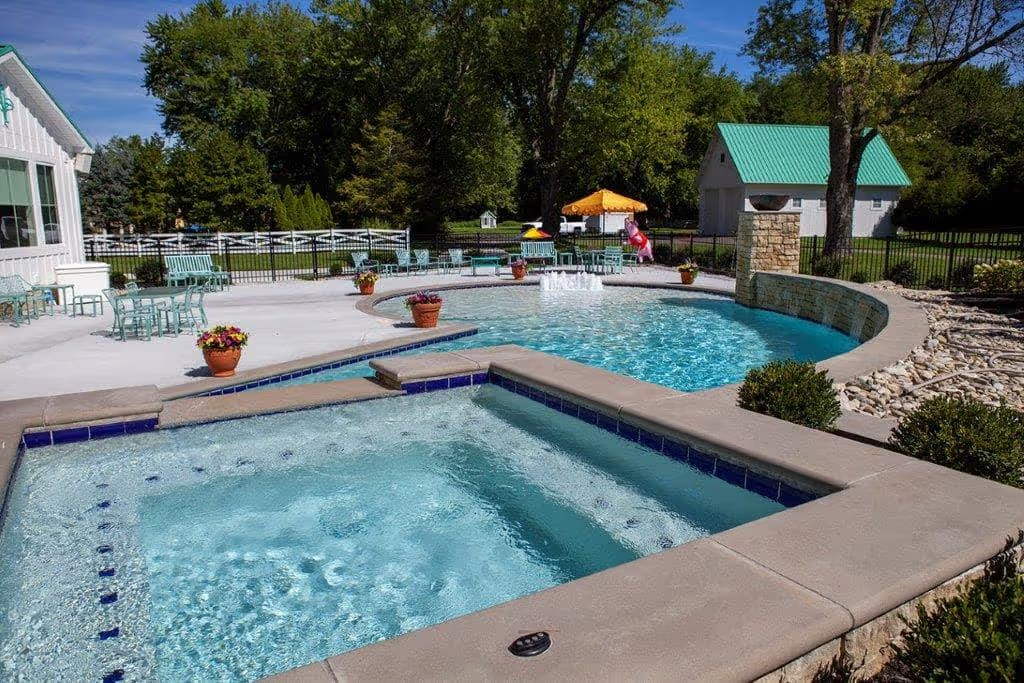- Stone Center
- Blog
Natural Stone Shower & Bathroom: What You Need to Know
23/7/2025
7/19/2024
Natural Stone Shower & Bathroom: What You Need to Know
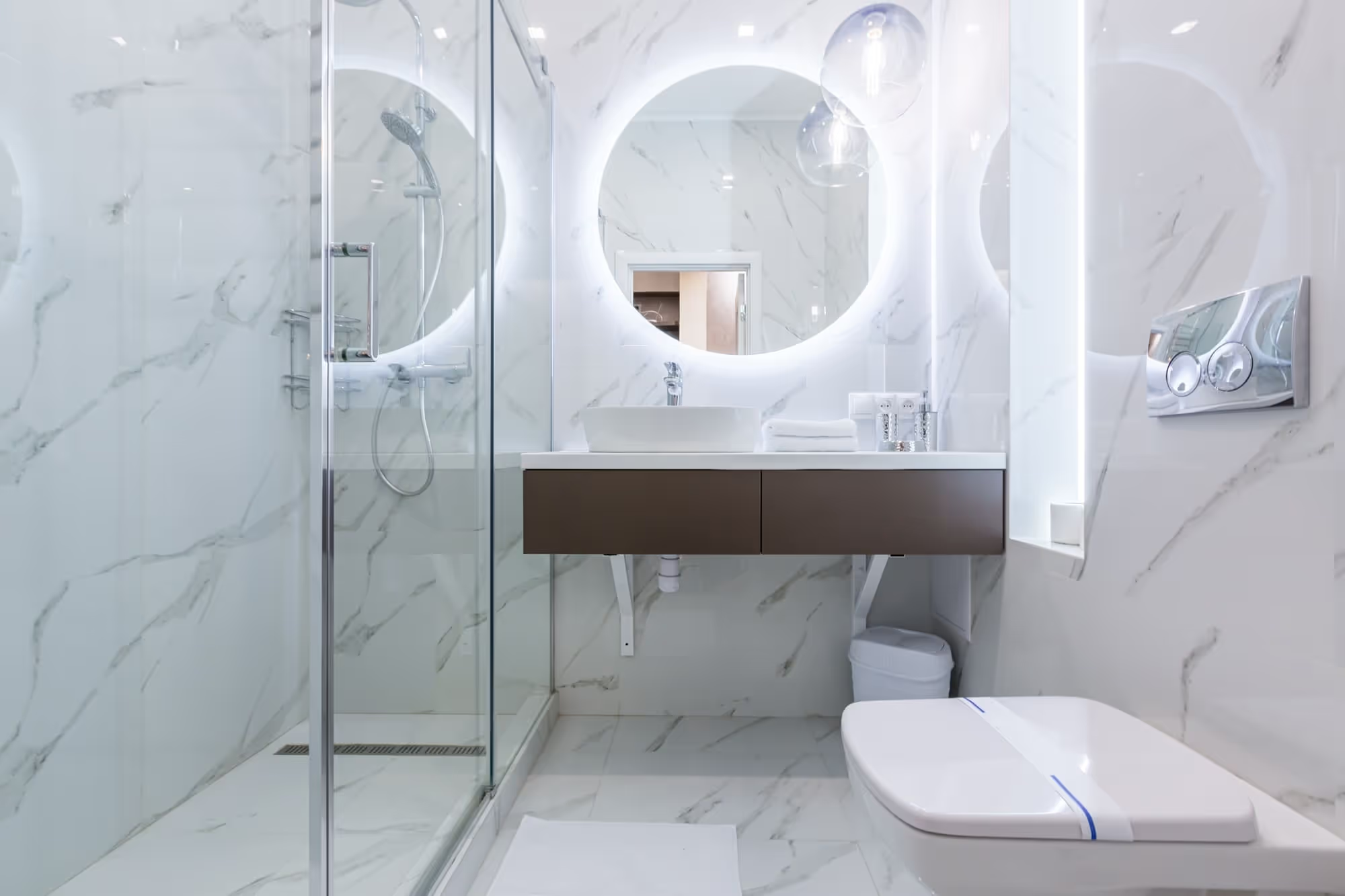
Natural stone has become increasingly popular in bathrooms and showers, prized for its enduring elegance and opulent ambiance. Its natural water resistance (when properly sealed) and durability make it an excellent choice for shower spaces. The diverse textures and colors available can easily transform a standard bathroom into a tranquil, spa-like haven.
But is natural stone the perfect fit for your home? In this guide, we'll cover everything you need to know about incorporating natural stone into your bathroom design.
Types of Natural Stone for Bathrooms
There are various options available when it comes to choosing natural stone for your bathroom, each with its own distinct qualities and maintenance needs.
Marble
Marble is a top choice for luxurious bathrooms. Its timeless elegance and classic appearance can elevate the aesthetic of any space.
Characteristics of Marble
Marble is celebrated for its graceful veining and classic charm. It comes in a broad spectrum of shades, from pristine white to deep black, often featuring stunning veins of color. These veins are formed by impurities such as iron oxide, lending the stone a unique and captivating look.
Maintenance of Marble Showers
To prevent staining and etching, marble necessitates regular sealing. Using pH-neutral cleaners and steering clear of abrasive products will maintain the pristine appearance of your marble. Due to its susceptibility to damage from acidic substances and harsh cleaning agents, consistent upkeep is crucial to preserving its beauty.
Granite
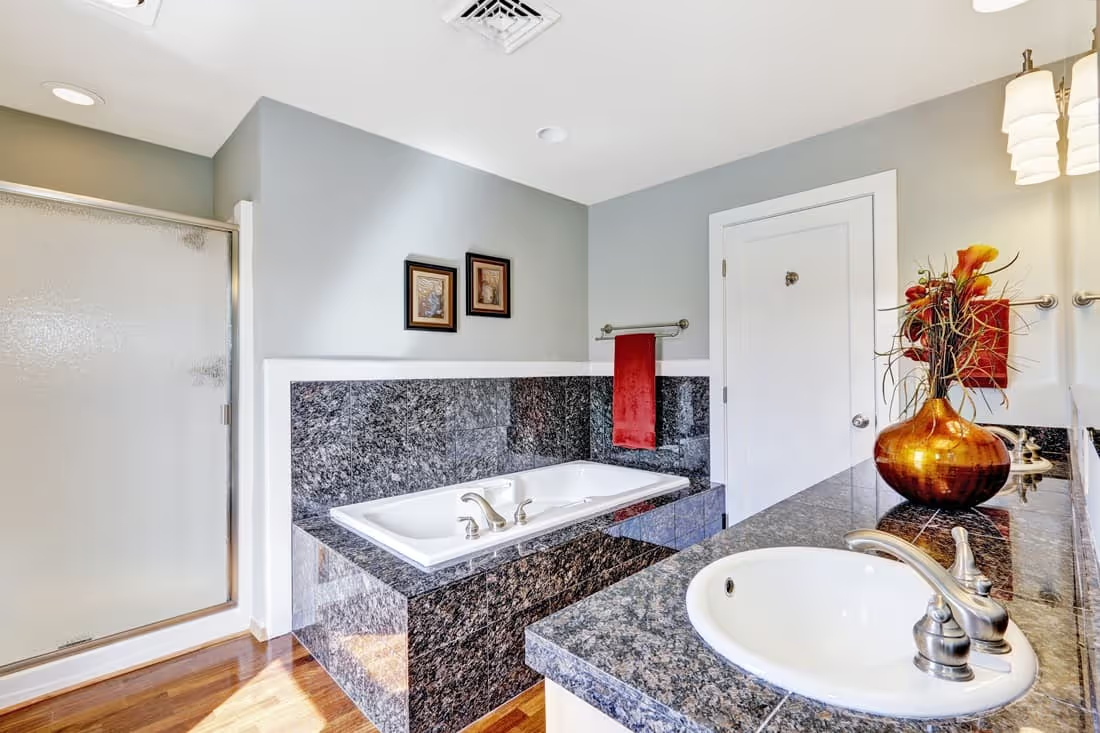
Granite is another excellent choice for bathrooms, renowned for its sturdiness and variety of colors and patterns.
Characteristics of Granite
Granite is a robust and resilient stone, available in a wide range of colors and patterns. Its granular texture adds a distinctive touch to any bathroom. Formed from molten magma, the stone boasts a unique texture and exceptional resistance to wear and tear.
Maintenance of Granite Showers
While granite is relatively low-maintenance compared to other natural stones, it still requires sealing for protection against moisture. Regular cleaning with mild detergents will keep it in excellent condition. Granite's resilience to scratches and stains makes it a practical choice for high-traffic areas.
Travertine
While granite offers durability, travertine is all about beauty and versatility.
Characteristics of Travertine
Travertine's pitted surface and warm hues create a rustic, earthy look, perfect for fostering a cozy and inviting bathroom atmosphere. Its naturally porous texture is a result of its formation in hot springs and limestone caves, giving it a unique appearance.
Maintenance of Travertine Showers
Travertine is more porous than other stones, requiring frequent sealing and gentle cleaning to avoid damaging its surface. Due to its porosity, travertine can absorb liquids and stains, so prompt cleaning of spills is crucial.
Slate
Slate is a versatile and durable stone that can add a unique touch to your bathroom design.
Characteristics of Slate
Slate provides a unique, textured surface with a variety of natural colors, ranging from dark grays to rich greens and purples. The stone's fine-grained, layered appearance stems from its formation through the compression of clay and volcanic ash over time.
Maintenance of Slate Showers
While slate is durable, it still requires sealing to prevent water penetration. Regular sweeping and mopping with a neutral cleaner will help maintain its beauty. Although less porous than travertine, slate still benefits from regular sealing to preserve its resistance to moisture and stains.
Designing with Natural Stone
Incorporating natural stone into your bathroom design can transform it into a luxurious retreat. Understanding how to integrate different types of stone allows you to create a cohesive and stylish space.
Incorporating Natural Stone in Shower Walls
Natural stone shower walls add visual interest and an air of opulence. Whether you opt for large slabs or smaller tiles, stone walls make a striking statement. The choice between slabs and tiles can influence the overall aesthetic and maintenance needs. Slabs offer a seamless look, while tiles provide more design flexibility.
Using Stone Veneer Panels
Stone veneer panels offer a simpler installation method while still achieving the look of solid stone. These lightweight panels can be used to create accent walls or focal points, mimicking the appearance of more expensive solid stone installations without the added cost and weight.
Combining Natural Stone with Other Materials
Combining natural stone with other materials like glass or porcelain creates captivating contrasts and accentuates the beauty of each element. This fusion can modernize the look while retaining elegance. Additionally, using different materials can help manage costs and maintenance, as you can combine the durability of porcelain with the luxury of natural stone.
Installation of Natural Stone Showers
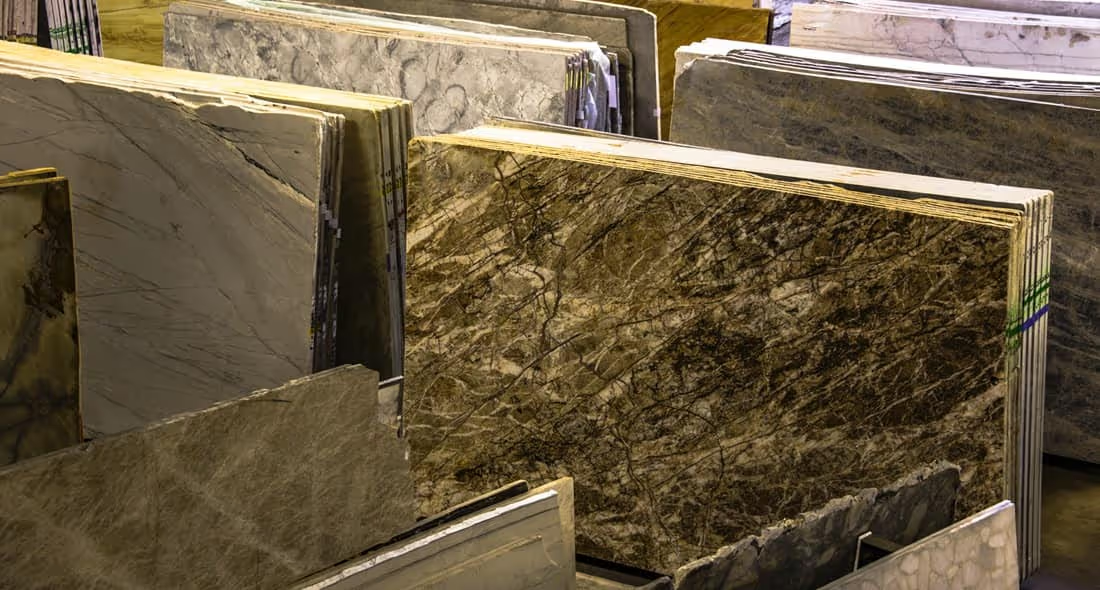
The longevity of your natural stone shower hinges on proper installation. Here's a breakdown of the steps and considerations involved in installing natural stone in your bathroom.
Preparing the Surface
Before you begin, ensure the surface is clean, dry, and level. This crucial step prevents future problems like cracking or moisture seepage. A well-prepared surface provides a stable foundation for the stone, guaranteeing proper adhesion and longevity.
Choosing the Right Adhesive and Grout
Choosing the right adhesive and grout is essential for a lasting installation. Epoxy-based products are recommended for their strength and water resistance. The grout color can also influence the overall aesthetic; contrasting grout highlights the stone's pattern, while matching grout creates a more uniform look.
Sealing Natural Stone
Sealing is vital to protect your natural stone. Penetrating sealers soak into the stone, offering protection from within, while topical sealers form a protective layer on the surface. Each type has its benefits: penetrating sealers provide longer-lasting protection, while topical sealers are easier to apply and reapply.
Apply the sealer evenly and allow it to penetrate the stone before wiping off any excess. Repeat this process periodically to maintain optimal protection. Regular sealing helps prevent stains and moisture damage, ensuring your stone remains beautiful and durable.
Maintenance and Care
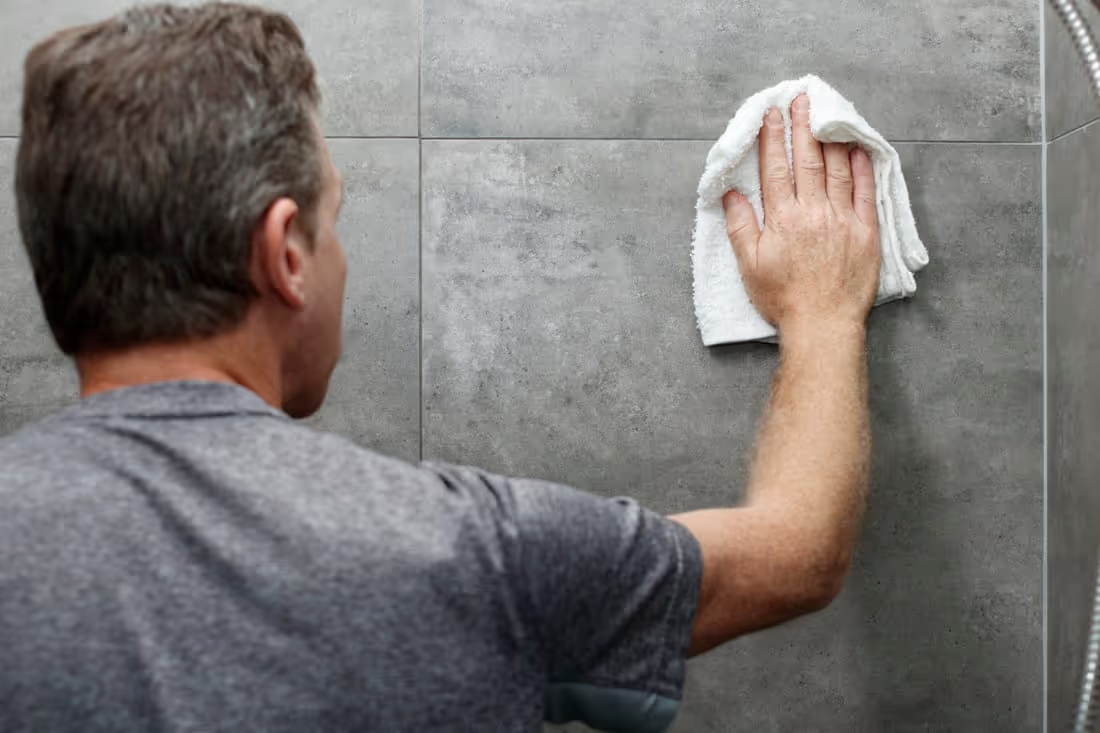
Maintaining the stone in your bathroom requires regular care to keep it looking its best. Here are some tips for daily and deep cleaning, as well as preventing common issues like mildew and stains.
Daily Cleaning Tips
After each use, wipe down the surfaces with a soft cloth to prevent water spots and soap scum buildup. Use pH-neutral cleaners to avoid damaging the stone. Regular cleaning helps maintain the stone's appearance and prevents the accumulation of dirt and grime.
Deep Cleaning Techniques
Occasionally, deep clean your stone with a mixture of water and mild detergent. Avoid abrasive cleaners that can scratch or dull the surface. For stubborn stains, consider using a poultice or a specialized stone cleaner formulated for deep cleaning without causing damage.
Preventing Mildew and Mold
Proper ventilation is key to preventing mildew and mold. Use exhaust fans and leave shower doors open to allow the area to dry thoroughly. Regular cleaning also helps prevent mildew growth. Keeping your bathroom dry and well-ventilated reduces the risk of mold and mildew, which can discolor and damage the stone.
Dealing with Stains and Soap Scum
For stubborn stains, try a poultice made from baking soda and water. Soap scum can often be removed with a mixture of vinegar and water, but test it on a small, inconspicuous area first to ensure it doesn't harm the stone. Regular cleaning with mild solutions helps prevent buildup and keeps your stone looking its best.
Pros and Cons of Natural Stone in Showers
Natural stone showers offer a plethora of benefits, but it's important to consider potential drawbacks to make a well-informed decision.
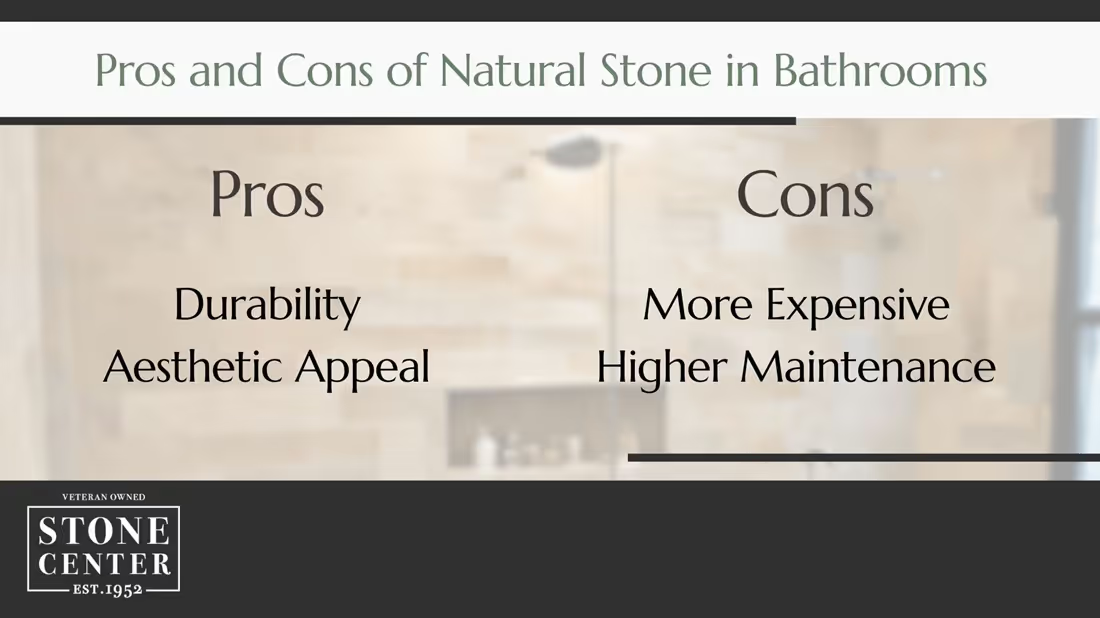
Pros:
- Durability: Natural stone is incredibly durable, promising a lifetime of use with proper care. It's designed to withstand daily wear and tear, making it an excellent choice for high-traffic bathrooms.
- Aesthetic Appeal: The distinct patterns and colors of stone create a visually stunning space. Each piece is a unique work of nature's art, infusing your home with a touch of the outdoors. No two installations are alike, adding a personalized touch to your bathroom.
Cons:
- Cost: Natural stone can be a significant investment in terms of both material and installation costs. However, it's an investment that rewards you with lasting beauty and value. The initial expense may be higher, but the enduring nature and stunning aesthetics of stone often justify the price.
- Maintenance Requirements: Stone surfaces require regular sealing and meticulous cleaning, demanding more attention than ceramic or porcelain tiles. If you're seeking a low-maintenance option, this is something to consider.
Conclusion
Incorporating natural stone into your shower and bathroom elevates your space, adding a touch of luxury and timeless beauty. While it may require more care and a larger upfront investment, the aesthetic and functional benefits make it a rewarding choice.
Whether your style leans towards the classic elegance of marble, the resilient beauty of granite, the rustic charm of travertine, or the unique textures of slate, natural stone has the power to transform your bathroom into a serene and spa-like oasis.
The key to enjoying these benefits is proper installation and consistent maintenance, ensuring your bathroom remains a haven of beauty and relaxation for years to come.
At Stone Center, we are passionate about providing top-tier natural stone products to suit your design needs. Ready to elevate your bathroom with natural stone? Contact our experts today and let us help you create the bathroom you've always envisioned.
FAQ
How often should I seal my natural stone shower?
The frequency of sealing depends on the type of stone and its usage. As a general guideline, we recommend sealing once a year.
Can natural stone be used on shower floors?
Absolutely! Just ensure it's properly sealed and choose a stone with a textured surface to prevent slipping.
What are the best cleaning products for natural stone showers?
To avoid damage, use pH-neutral cleaners specifically designed for natural stone.
Is natural stone a good choice for small bathrooms?
Absolutely! Natural stone can make small bathrooms look luxurious and spacious.
How do I prevent mildew growth in my natural stone shower?
Ensure proper ventilation, clean regularly, and dry surfaces after each use to prevent mildew.
.avif)
Jon, the owner of Stone Center, is a knowledgeable expert in natural stone products, specializing in various types of stone for landscaping and architectural projects. Passionate about promoting the beauty and versatility of natural stone, Jon aims to use these blogs to inspire readers with creative ideas to upgrade their homes.
How much does it cost to get a stone restored?
How much you end up spending to restore stone varies on the type of stone, the technique, and the stone’s current condition. Stone in good condition will cost less to restore, whereas stone that has a lot of wear and tear may require a longer restoration.




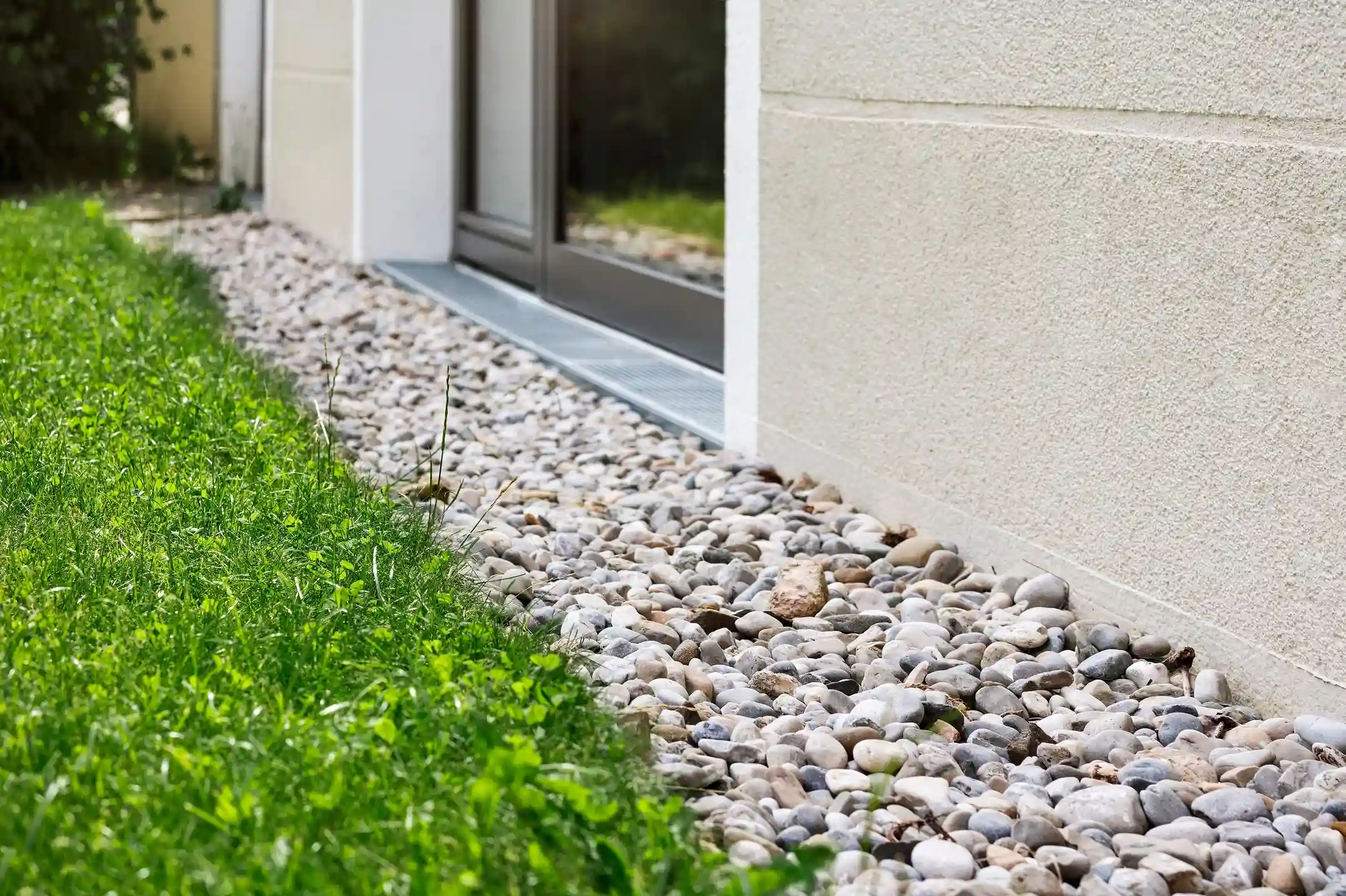


.avif)
.avif)
%20(1)%20(1).avif)
.avif)
